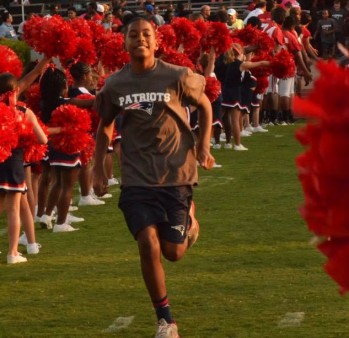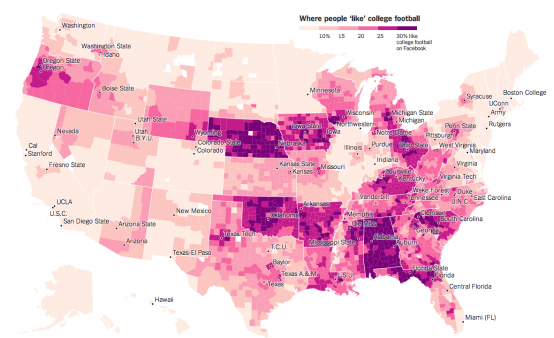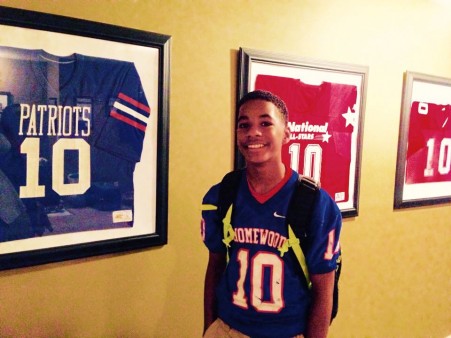As Concussion Awareness Rises, Football Focuses on Safety
The new school year may not start for a few weeks, but football players are already on the practice field. Increasingly there’s a focus on safety, particularly on preventing head injuries and concussions. All this week WBHM explores what this means for our football consumed state. To start, WBHM’s Rachel Osier Lindley takes us to a local football camp to see how parents’ and coaches’ attitudes toward the game are changing.
It’s early on a recent Thursday morning and dozens of Homewood Middle School football players shuffle around the grass at Homewood High School. They’re ready to practice, dressed in white T-shirts, red shorts and white helmets.
A sharp whistle blasts.
“Hey guys, let’s ease down to the field,” yells Ben Bergerson, Homewood High School’s head football coach. He leads the nervous and excited young players to the practice fields. It’s the first day of a camp designed to introduce these aspiring football players to the coaches they’ll work with once they reach high school.
“Hey guys, y’all get a knee right here,” he tells the players. They kneel and face him, listening intently as he explains the drills they’ll work on today. “I hope y’all learn a lot over the next couple of days,” he says.
High school coaches think it’s important to build those relationships with young players early because it’s never too soon to get serious about the sport.
Jay Roberson says he started off at six years old and 80 pounds, playing football in Homewood. He’s here to watch his seventh grader, Trey, at camp.
“To see that he’s playing quarterback, on the same field I played on 25 years ago, wearing the same number, number 10,” Roberson beams. “I’m just excited. I’m a happy father.”
Football is a big part of Roberson’s life. He’s coached and been an athletics administrator. He also played in college during what he describes as a very different time in football’s history.
“I mean, coaches were not conscious then of guys passing out,” he explains. He imitates a common conversation he’d overhear in his football days. “‘Hey, get up, son’ You know. ‘You’re gonna be fine, keep going on, you’re gonna be alright.’ ‘Coach, my head hurts. I have a headache.’ ‘You’ll be fine, get back on the field.'”
Roberson suffered from several concussions during his football career and says he wants to protect today’s players. He’s now the director of business development for the National Center for Sports Safety. The group works with municipalities and teams to educate volunteers, parents and coaches about how to prevent and treat sports injuries, primarily concussions.
Roberson says it’s something everyone is talking about.
“You have some parents now that are you know, within my age group in their mid-forties or thirties, saying, ‘Hey I don’t want my child to play football,’ because they’re concerned about their safety.”
And it’s not just here in Alabama, the state with more football fans per capita than any other. Nationally, the majority of players’ parents think the sport should be safer, according to a recent NPR poll. And 7 percent of parents polled said they thought football was too dangerous for their children to play.
Darin White is a professor at Samford University and coordinator of the school’s sports marketing program.
“When it comes to parents making the decision to let their kids play football, we’ve seen over the course of the last 10 years or so a decline in the participation in football,” says White, though he says support is still strong.
White adds that, while more than 10 million young people played football in 2006, that’s fallen to around 7 million. And that has some concerned for football’s future as a treasured American pastime.
“If this participation decline continues, you’d expect it to start playing out on the spectator side as well,” he says.
Football programs from the NFL down to Pop Warner are responding with an emphasis on player safety. Teams now tackle less in practice, and many are purchasing new helmets that supposedly offer better protection. Even the government is involved. In 2011, the Alabama legislature passed the Alabama Sports Concussion law. Among other things, it mandates athletes get cleared by a physician before returning to play after a concussion.
Eddie Crocker is assistant football coach at Homewood Middle School. He says Homewood’s coaching staff is constantly striving for player safety.
“As a parent and as a coach I just try to teach the right technique, use good equipment and go from there,” says Crocker.
Roberson agrees.
“I don’t see football being a sport that’s going to injure my son,” he says. “If he gets hurt, you know, we’ll deal with it. But at the end of the day, I know all the precautions are being put in place for him to be able to compete on the field.”
And, as concern increases, so do those precautions, even at the college level. Just last week, the SEC announced they’ll now have an independent medical observer in the replay booth at every game monitoring players for head and neck trauma.
America’s top figure skaters dazzled St. Louis. I left with a new love for the sport.
The U.S. Figure Skating National Championships brought the who's who of the sport to St. Louis. St. Louis Public Radio Visuals Editor Brian Munoz left a new fan of the Olympic sport.
DHS restricts congressional visits to ICE facilities in Minneapolis with new policy
A memo from Homeland Security Secretary Kristi Noem, obtained by NPR, instructs her staff that visits should be requested at least seven days in advance.
Historic upset in English soccer’s FA Cup as Macclesfield beat holders Crystal Palace
The result marks the first time in 117 years that a side from outside the major national leagues has eliminated the reigning FA Cup holders.
Venezuela’s exiles in Chile caught between hope and uncertainty
Initial joy among Venezuela's diaspora in Chile has given way to caution, as questions grow over what Maduro's capture means for the country — and for those who fled it.
Sunday Puzzle: Pet theory
NPR's Sacha Pfeiffer plays the puzzle with KAMW listener Daniel Abramson of Albuquerque, N.M, and Weekend Edition Puzzlemaster Will Shortz.
Inside a Gaza medical clinic at risk of shutting down after an Israeli ban
A recent Israeli decision to bar Doctors Without Borders and other aid groups means international staff and aid can no longer enter Gaza or the West Bank. Local staff must rely on dwindling supplies and no international expertise.










